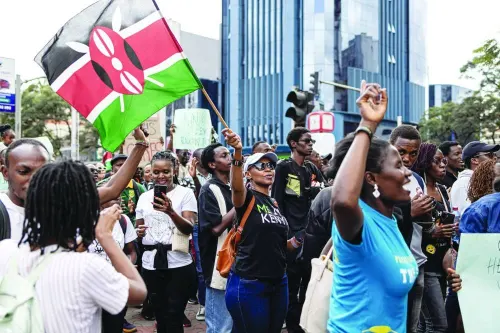Less than two years into his presidency, Kenyan President William Ruto is facing rising public disapproval, with chants of “wantam” — shorthand for “one term” — echoing through the streets. Protesters raise their index fingers symbolically, calling for Ruto to step down by the end of his term in 2027. Some say even that is too far off.
Once hailed as a voice for the working class, Ruto’s approval has plummeted following the introduction of aggressive tax reforms viewed as a betrayal of his campaign pledges. Defending the tax hikes, Ruto insisted they were necessary to keep the government functioning, but the backlash has been severe.
Last year, anti-tax protests swelled nationwide, led by thousands of young people. Despite failing to push Ruto to resign, the movement’s intensity was underscored by a violent episode that left at least 22 dead and saw protesters storming Kenya’s parliament in Nairobi. In response, Ruto promised such chaos would not recur.
However, fresh demonstrations have erupted after a blogger died in police custody, sparking new outrage. Many view the incident as further evidence of authoritarian rule, with Ruto firmly in control of both the legislature and security forces.
Critics accuse the administration of corruption, nepotism, and opulence at the expense of struggling citizens. Ruto is derisively nicknamed “Zakayo” — a reference to the biblical tax collector Zacchaeus — and “mwizi,” Kiswahili for thief.
Public anger intensified over a controversial deal involving Kenya’s main airport and the Indian-based Adani Group. The deal, terminated after becoming public, reinforced perceptions of secretive governance and tone-deaf leadership.
Ruto’s ongoing negotiations with the International Monetary Fund (IMF) have drawn criticism as many believe the reforms disproportionately burden the poor while enriching the elite. He told Harvard Business School students that he would not govern “a bankrupt country,” a statement that some Kenyans found dismissive of their economic pain.
The situation is further aggravated by fears of political repression. “You can disappear for simply speaking against the government,” said Eileen Muga, an unemployed Nairobi resident. Student Peter Kairu expressed skepticism that corruption and nepotism would be addressed, stating, “Until we decide to be the change ourselves.”
Interior Cabinet Secretary Kipchumba Murkomen has vowed a tough crackdown on protesters, while Ruto recently warned that unrest could destroy the nation. “If there’s no country for William Ruto, there’s no country for you,” he said, highlighting the deepening rift between the government and its people.
Ruto’s past is marked by political rivalries. As deputy president, he clashed bitterly with then-President Uhuru Kenyatta, with local media reporting that Ruto once confessed he was so enraged he wanted to slap Kenyatta. Their alliance soured during their second term, and Ruto narrowly won the 2022 election against Raila Odinga, Kenyatta’s preferred candidate.
Ironically, Ruto has since brought Odinga closer, effectively neutralizing him as an opposition figure. Meanwhile, Vice President Rigathi Gachagua was impeached less than two years into office, with Gachagua accusing Ruto of orchestrating his political downfall.
Ruto had campaigned as a champion of the underprivileged — the so-called “hustler nation.” His message resonated with informal workers and small-scale traders. Aligning himself with evangelical Christianity, he was frequently seen holding a Bible and preaching from pulpits.
But since assuming office, his policies — including the removal of fuel subsidies and a controversial finance bill — have left many feeling betrayed.
“He overpromised and underdelivered,” said public policy analyst Eric Nakhurenya. “That’s why Kenyans are angry.”

